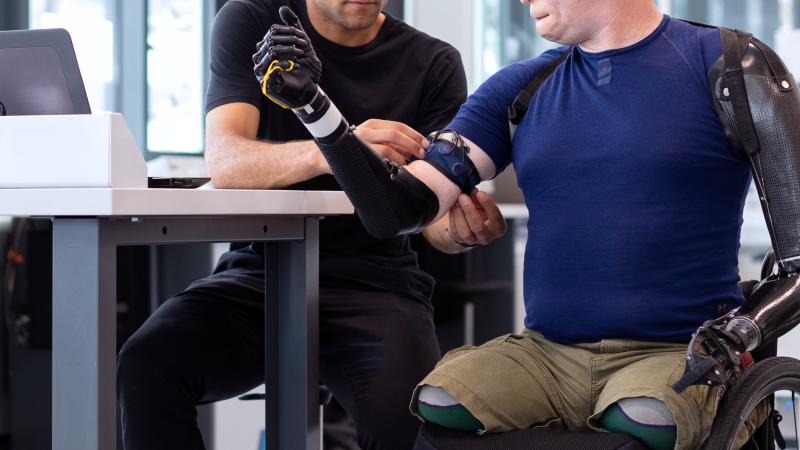Do you believe in social progress and the power of networks to solve problems? Steven Johnson does. And he's coined a new term for himself and others like him -- the peer progressive movement. We'll learn all about it as we explore how digital networks are changing our lives.Read more
Episode Archives
Do you ever have a right to kill? What about Israeli agents who assassinate Hamas leaders? Or suicide bombers who blow up their enemies? Do the ends justify the means? William Vollman has written a three-thousand page treatise on the morality of violence. In this hour of To the Best of Our...Read more
The atom bomb's ability to kill people makes it a literal dangerous idea. But there are other kinds of dangerous ideas -- ideas that are contrary, counterintutive and just plain unconventional. It's that kind of dangerous idea that we explore in this hour.Read more
Ben Franklin, Henry Ford, Abigail Adams, Elvis Presley. Know what they have in common? They're all on Daniel Wolff's list of great Americans. Wolff explains the unique ways those people learned what they had to know. We'll also take a hard look at IQ and its relationship to race and class, and...Read more
As artists and scientists explore the edges of our senses, what we touch, taste, see, smell, and hear is changing.
In this hour we hear from a psychiatrist who’s using touch to help people recover from trauma, investigate a mysterious sensory experience that gives some people euphoric...Read more
Investigative journalist Seymour Hersh made his name when he broke the story of the My Lai Massacre. Looking back you have to wonder: why did Lt. William Calley tell Hersh he’d killed hundreds of Vietnamese civilians? On this hour of To the Best of Our Knowledge Hersh says “because I asked him...Read more
Governors are slashing state spending, and the President has put some of his own party's favorite programs on the chopping block. But how much of the new austerity is really necessary, and how much is politics? In this hour of To the Best of Our Knowledge, is austerity a dangerous idea? Join...Read more
We’re all a little bit wild inside, but how often do we let it out? If you've been spending too much time indoors in front of a screen, maybe it's time for a dose of the real thing. This week,stories of people who found strength, wonder and joy by heading into the wild.Read more
Many Americans think the story of Cuba begins and ends with Fidel Castro. But the soul of the Cuban Revolution belonged to the charismatic, Romantic guerilla hero Ernesto “Che” Guevara. To the Best of Our Knowledge revisits the Sixties and counts the private costs of that era’s social gains. ...Read more
He was a wandering pilgrim who talked to birds, healed the sick and tamed wild beasts. He was also the closest thing to a medieval rock star - a man so revered in his lifetime that people tore at this clothes, desperate to touch a living saint. Today, St. Francis of Assisi is admired by both...Read more
If you ever find yourself on a dark country road in Ireland, bring along some salt, red thread, and a cross. That’s what you’ll need to protect yourself from “the other crowd.” Next time on To the Best of Our Knowledge, the fairies of Ireland. They’re magical, vengeful, and still alive and...Read more
For the first time in American history, young women are choosing independence over marriage. Single women today outnumber married women and have more political power than ever before. It's what Susan B. Anthony, Margaret Sanger and other feminist icons predicted. This hour, how...Read more
Next time you catch an old episode of the Flying Nun, you may want to pay attention. Because today’s convents are closing. The average nun is seventy years old, and even devout sisters often have to bite their tongues when they talk about the pope. In this hour of To the Best of Our Knowledge...Read more
“We can be bought,” they said,” but we can’t be bored.” The king and queen of American theater, Alfred Lunt and Lynn Fontanne turned down a fantastic sum from the movies in the middle of the depression to continue to live their illusion on the stage. In this hour of To the Best of Our...Read more
Ingrid Betancourt was kidnapped by Marxist rebels in Columbia while in the midst of her presidential campaign. She spent the next six and a half years in captivity chained, humiliated and abused. But her greatest fear was not death. It was losing her humanity. In this hour of To the Best of Our...Read more
Novelist John Updike doesn’t like doing interviews. At least until the interview starts. Then he realizes it’s kind of flattering to talk about himself. Now, he’s written a novel about a famous artist being interviewed. In this hour of To the Best of Our Knowledge, John Updike on why an...Read more
As America endures the worst economic crisis since the Great Depression, the hardships our grandparents and great grandparents lived through are suddenly relevant again. In this hour of To the Best of Our Knowledge, stories from the Great Depression – advice from the generation that survived...Read more
President Obama is out to remake America's relationship with the Islamic world. We'll explore what this means for both the Middle East and the U.S. We'll also look at the ongoing debate over Muslim immigration in Europe, and we'll talk with a Hollywood screenwriter about his new novel on the...Read more
Celebrate Midsummer's Eve with a visit to the fey folk. In this hour of To the Best of Our Knowledge, we'll have an hour filled with stories of changelings and other-kin, Fairy Courts and green children. We'll conjure up a world of enchantment, but beware! There are no Tinkerbells in the world....Read more
A fashion model with prosthetic legs… a musician who can’t hear… a writer who can’t see. Instead of disabled, differently-abled, handicapped – why not better-abled?Read more
It used to be simple to pick out a shade of paint, before computers made almost infinite gradations possible. Now if you stare at those samples long enough they all start to look alike. It turns out color is as much a mental construct as a physical substance. In this hour of To the Best of...Read more
From the minute we can pick up a crayon, most of us want to draw something - a house, a tree, the sun. As we get older we aim for nuance and sophistication - landscapes and shadows, faces and expressions. A gifted few will achieve something greater - they’ll make art. On this hour of To the...Read more
These days it seems we just can’t get enough of it. Over the past few years, luxury spending in the United States has been growing four times faster than overall spending. We’re spending more money on more products and services that we don’t really need – like Evian bottled water and Prada...Read more
Is the NSA wiretapping story really new? Sure, whistle blower Edward Snowden is all over the news. But people were talking about federal surveillance ten years before leaked documents about “Prism.” In this hour, we take a look at what we know about government surveillance and when we knew it...Read more




